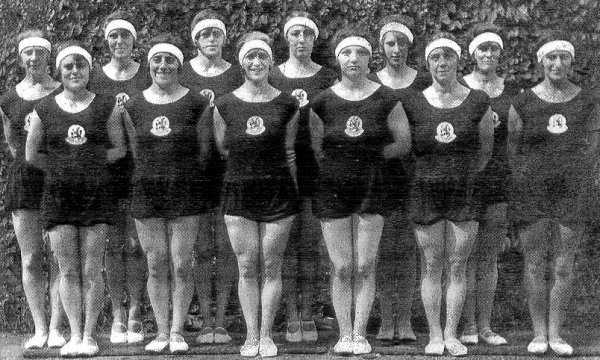Meer dan 50 jaar was er weinig bekend over het lot van het Nederlands Vrouwen Gymnasiasten Team dat goud won op de Olympisch spelen van 1928 in Amsterdam. De spelen van 1928 waren de eerste waar vrouwen konden deelnemen aan gymnastiek wedstrijden.
Dit is het tragisch verhaal van het team.
Het gouden Nederlands Gymnasiasten Team van de Olympische spelen van 1928.
Een weergave van een artikel over het lot van het Nederlands Vrouwen Gymnasiasten Team dat een gouden mediale won op de Olympische spelen van 1928.

Elka de Levie (tweede van rechts) met haar gouden Olympisch team.
Door: Redactie Joods MonumentFate of victorious 1928 Dutch
Olympic team uncovered.
A FEW weeks back we remembered those
who died in the Holocaust and recently I
came across the story of the 1928 Dutch
women’s gymnastics team, who won gold at
the 1928 Olympics in Amsterdam.
For over 50 years, the fate of almost half of
that team remained unknown. The 1928
Games were the first in which women participated
in gymnastics events.
This is the tragic tale of the team, once the
Nazis occupied Europe.
The 12-woman Dutch team became local
heroes after recording a score of 316,75
points to beat Italy and Great Britain for first
place, one of just six golds won at the Games
by the Netherlands.
Five of the gymnasts, as well as their
coach Gerrit Kleerekoper, were Jewish. Only
one of those six survived the Holocaust.
Kleerekoper made a living as a diamond
cutter, but his true passion was gymnastics.
He painstakingly put together a gold-medal
winning team that competed in Drill,
Apparatus, and Jumps, with medals only
being awarded for allround team performance.
It was known that Kleerekoper died at
Sobibor on July 2, 1943, but it was not until
the mid-1990s that the fortunes of Estella
Agsteribbe, Helena Nordheim, Anna Polak,
Elka de Levie, and Judikje Simons were
finally established.
The Netherlands Olympic Committee
could find no trace of them, despite many
years of searching, due to the fact that the
Nazis, who kept very systematic records, did
not bother to include the maiden names of
their female victims.
The gymnasts had all likely married after
1928. However, thanks to one relentless
Dutch engineer, Fred A Lobatto, who as a
schoolboy saw the 1928 Games, the fates of
the five Jewish female members of the Dutch
gymnastics team were finally brought to
light.
Judikje Simons, later Judikje Themans-
Simons, born August 20, 1904, died March 3,
1943, at Sobibor, together with her husband,
Bernard, their five-year-old daughter Sonja,
and their three-year-old son Leon.
Simons, who ran an orphanage with her
husband in Utrecht that housed 83 children,
had apparently been warned that the Nazis
were heading her way, and was offered a
hiding place by Dutch friends.
However, she had no intention of forsaking
her orphans, sealing her fate, and that
of almost all of the children. It is believed
that Jewish gymnasts were many times the
first to be rounded up by the Nazis as their
excellence in what the Germans considered
the purest of sports, dispelled their belief in
the supremacy of the Aryan race.
Four months after Simons’ death, Helena
Nordheim, later Helena Kloot-Nordheim,
born August 1, 1903, was gassed on July 2,
1943, at Sobibor, with her husband,
Abraham, and their 10-year-old daughter
Rebecca.
On the exact same day at the exact same
place, Kleerekoper, born February 15, 1897,
also died with his wife, Kaatje, and their 14-
year-old daughter Elisabeth. His 18-year-old
son Leendert died at Auschwitz on July 31,
1944.
Anna Polak, later Anna Dresden-Polak,
born November 24, 1906, died July 23, 1943,
at Sobibor, together with her six-year-old
daughter, Eva. Her husband, Barend, died
at Auschwitz on November 30, 1944.
Estella Agsterribe, later Estella Blits-
Agsterribe, born April 6, 1909, died on
September 17, 1943 at Auschwitz, together
with her six-year-old daughter Nanny and
two-year-old son Alfred. Her husband,
Samuel Blits, died on April 28, 1944, at
Auschwitz.
The only Jewish gymnast of the triumphant
Amsterdam team to survive the
horrors of the Holocaust was Elka de Levie,
whose story of survival remains untold.
She died on December 12, 1979.
Bron: Milner, Jack; South African Jewish Report, 20 mei 2011, pagina 20 (de heer Milner heeft zijn artikel mede gebaseerd op een artikel uit de Jerusalem Post).